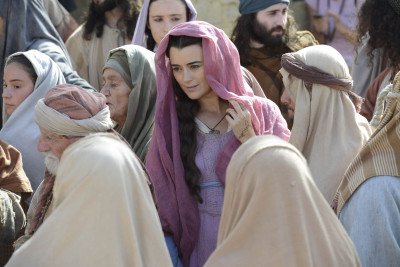I’m a sucker for Jewish stories that revolve around women, particularly going back to Biblical times. Anita Diamant’s The Red Tent was such story story that took the route and appeared on Lifetime a few years ago. It wasn’t the best adaptation but I give the network credit for even trying to tackle such a complicated, brave story (particularly as a former Lifetime staffer).
CBS is bringing another feminist, Biblical tale to the screen as a 4-hour mini-series callled The Dovekeepers (based on a book by Alice Hoffman). It premieres on Tuesday, March 31 and Wednesday, April 1, 2015 (9:00-11:00 PM, ET/PT).
Just in time for Passover, the story is about a group of women whose lives intersected during the siege of Masada. The film is based on true events at Masada in 70 C.E. when Jews were forced out of their homes in Jerusalem by the Romans and then ensconced in a fortress at Masada, a mountain in the Judean desert. Besieged at Masada, the Jews held out for months against the vast Roman armies.
Of the 900 Jews who were captive in the fortress at Masada, holding out for months against the vast Roman armies, it is alleged that only two women and five children were said to have survived the siege. And as this story goes, it was Shirah, a powerful mystic and healer who was trained by Egyptian priestesses to be a faith healer and reader of omens who helps them escape through a system of subterranean cisterns.
For the first time in history, this story is being told from the female perspective. The women at Masada worked together as dovekeepers and shared a bond, all withholding deep secrets. We see flashbacks and hear stories about their mothers, their childhoods, what brought them to this point in history. While the film is a melodrama full of tension, violence and sex (perhaps a bit too much), it’s refreshing to see a major network bring a Jewish, feminist tale to the screen.
This story is a story of survival. It brings to mind the anti-Semitism that exists today and the fights that are ongoing in France and around the world. The main character tells us, “I’m not a woman. I’m a warrior.” It’s this kind of fierce ambition that will push us forward. And it comes from a woman.
Here’s a clip:
Disclosure: This is a sponsored post. I’m working with the folks at Role Mommy but all opinions are my own.








 Follow
Follow





“The film is based on true events at Masada in 70 C.E. when Jews were forced out of their homes in Jerusalem by the Romans and then ensconced in a fortress at Masada, a mountain in the Judean desert. Besieged at Masada, the Jews held out for months against the vast Roman armies.”
Utter poppycock. Jews were not forced out of their homes in Jerusalem by the Romans. It was radical Jews who had ambushed the Roman garrison in Judea, ambushed the Legion first sent to recover the area, and so on. The radicals also made a habit of killing more moderate Jewish factions, and the rebels set about killing each other once they had taken Jerusalem. Once the Romans retook the city, a particular sect—the Sicarii—hid in Masada. The Sicarii were assassins who thought that the Zealots were too reasonable, and they were given their name for their habit of stabbing people in crowds with daggers, which included moderate Jews.
Also, the Sicarii did not hold “out for months against the vast Roman armies.” Masada was an old fortress of Herod’s on a plateau, and there was not adequate access for the Legion to attack. It took the Romans months to build a ramp up to the old fortress. There was no effort to take the fortress prior to that time, and there also was no effort by the Sicarii to fight their way out. According to Josephus, the Jews had killed themselves aside from two women and five children, but archaeological evidence instead suggests that the Romans took the fortress with little trouble and captured the Jews inside.
Glossing over the reason for the war, suggesting that the Romans were fighting “the Jews” rather than certain radicals, and implying that “the Jews” resisted the Romans at Masada rather than hiding inside until captured all serve to demonstrate why “pop culture history” is so dangerous. Books and media like “The Dovekeepers” pass themselves off as “historical fiction,” but virtually none of it is accurate to history yet people come away thinking it is.